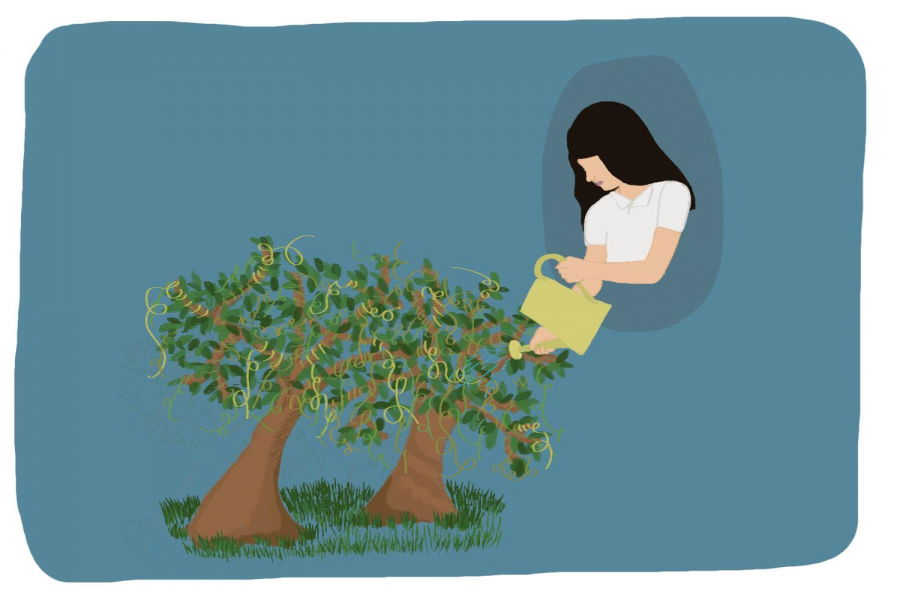Column: A natural connection
Photo credit: Leslie Castaneda
Dodder vines are part of the convolvulaceae family, also known as morning-glories. This silly-string style vine does not go through photosynthesis, resulting in the dodder having to live off of other plants. Photo illustration by Leslie Castaneda ’20.
Maybe it’s my last name, but I’ve always felt a strong connection to plants.
At a young age, my ability to feel one-sided empathy for greenery was strong. I have vivid memories of pretending to be a ‘plant doctor’ and placing bandages on the vine in my backyard whenever it secreted milky sap. I was clearly a young professional in plant medicine, so naturally, it was my duty to help any ill plant I saw. One day in a park, I created a sling for a tree whose branch appeared broken to my 7-year-old self.
Soon, I believed I could talk to trees and I would spend many recesses chatting with my plant patients. To my eventual frustration, they were very poor conversationalists. Due to my experience as a truly qualified plant practitioner, I now attempt to solve the question in this column: “Do plants have feelings?”
As far as scientists have researched, plants do not have the capacity for emotion as they do not have a brain or a central nervous system like us humans. However, plants respond to stimuli and have the ability to feel, hear and process information. Researchers even noted that plants release a defense chemical when they play the sound of caterpillars eating leaves.
One plant species, Mimosa pudica, closes and folds its leaves when touched. Scientists believe this is a way of frightening hungry herbivores. Plants also have a circadian clock and will “‘sleep” at night. They also exhibit proprioception, or the ability to know where they are in relation to their surroundings.
Personally, I find a plant’s sense of smell most intriguing. Dodder vines, plants in the genus Cuscuta, attach on to host plants with the goal of stealing their nutrients. Dr. Consuelo De Moraes, a biologist at Penn State University, conducted an experiment in order to test the dodder vines’ sense of smell. Morales discovered that the dodder reacted to the different smells and appeared to have a preference for tomato plant hosts. Time and time again, the vine attached on to the object that smelled like tomatoes. Dodder vines went for tomatoes instead of less nutritious wheat. Even when offered a tomato plant that could not be smelled under glass, the dodder vine opted for a tomato-scented vial.
If this topic intrigues you and leaves you wanting more, I suggest watching a documentary by the Professor of Biological Sciences at the University of Alberta James Cahill entitled What Plants Talk About.
It’s important not to compare plants fully to animals, for this runs the risk of concluding that plants are inferior. Although plants cannot love me back, their leafy intelligence is impressive. I have come to terms with their lack of emotion, and am instead in awe of their biological abilities.

Zoe Bush became a columnist in the 2018-2019 school year. Her column focuses on nature. She hopes to share her knowledge and make readers laugh in the...












Maya Wernick • May 6, 2019 at 7:27 am
Zoe! What a wonderful article. You seamlessly mixed humor with information and I both learned a lot and laughed a lot while reading it! Keep up the good work; I am so proud of you